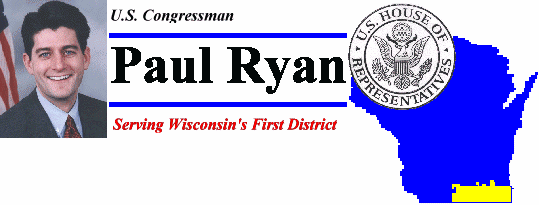

Parents and teachers know best how to teach America’s children, unlike bureaucrats sitting in Washington. I believe that increased local control over education dollars is an important factor in improving the overall quality of education. One-size-fits-all solutions passed down from Washington bureaucrats have been tried, and they fail almost every time. I’ve worked to help local schools and school districts have more flexibility to spend education dollars as they see fit.
President Bush’s education agenda revolves around flexibility and accountability. We share a similar philosophy on how to improve the education system in America today. I look forward to working with the new Administration to pass legislation similar to the bills that I supported last Congress.
Working for local flexibility. Last Congress I supported the Education Flexibility Partnership Act of 1999, H.R. 800, also known as the Ed-Flex bill. This legislation was signed into law by the President. The measure expanded a twelve-state pilot program to apply to all 50 states. It permits states to waive certain statutory and regulatory requirements for several federal education programs, allowing them to prioritize resources based on local needs. Ed-Flex allows state education agencies to determine which programs have the greatest need for scarce federal funds.
Another measure from last Congress designed to provide greater local control is the Academic Achievement for All Act, also known as the Straight A’s Act, H.R. 2300. I voted for this legislation, which would give states and school districts maximum flexibility to administer up to 14 federal K-12 education programs, as long as they improve academic achievement for all their students. This legislation would free state and local leaders to focus on meeting students’ most pressing education needs, rather than on keeping up with endless regulatory paperwork from Washington. It also fosters accountability: in exchange for greater freedom from federal mandates, states will be asked to demonstrate improved academic achievement.
I also supported the Teacher Empowerment Act, H.R. 1995, in the 106th
Congress. This bill would have combined the current education funding with
Goals 2000 and the President's class-size reduction program, creating a $2
billion fund for states to use to boost academic achievement through improved
teacher quality.
As a result, this bill would have given school districts
more flexibility to determine how best to use the funds to meet their individual
education needs, such as training new teachers or reducing class size. This
legislation passed the House but was never taken up by the Senate. This
year, Congress continues to grapple with the issues of improving teacher quality
and class-size reduction mandates.
Helping disadvantaged students. I supported the Student Results Act, H.R. 2, which would renew Title I of the Elementary and Secondary Education Act (ESEA) signed into law in 1965. Title 1 is the largest federal program to help disadvantaged students. The legislation would have helped students in failing schools by boosting academic accountability, enabling school choice among public, not private, schools, holding Title I school teachers to high standards, rewarding school performance, and increasing funding for Title I. This bill passed the House in October 1999 as part of ESEA but was never taken up by the Senate.
Leave No Child Behind. This year, the House of Representatives is working to implement President Bush’s education agenda, H.R. 1, Leave No Child Behind. This legislation includes the provisions of the previously mentioned Straight A’s plan to allow States to bypass certain federal rules, red tape, and funding requirements in exchange for agreeing to meet certain performance standards. In addition, this proposal offers students in chronically failing public schools by empowering parents by giving them access to a choice “safety valve.” It would enable parents to send their children to another public school, or to use federal funds to hire a private tutor. To ensure academic accountability, H.R. 1 would require states to design and implement math and reading tests for students in grades three through eight. Schools would be rewarded or sanctioned based on how well they are teaching their students.
I believe that this is a responsible bill, which would encourage greater performance standards for schools and give parents and teachers more options.
Funding Special Education. In 1975, Washington enacted the Individuals with Disabilities Act (IDEA,) requiring states and local schools to provide free and equal educational opportunities to disabled students. In doing so, Congress committed to pay for 40 percent of the average per pupil costs in educating these students. However, the federal government currently pays under 15 percent of these special education costs. In areas of Wisconsin, the actual percentage paid by the federal government is between 7 to 10 percent. By failing to live up to its responsibility, Washington has placed an unfunded mandate on local schools, costing them billions of dollars.
I believe in the importance of providing equal educational opportunities to disabled students and have made special education funding a priority. I am working with my colleagues to enact legislation that would fund the federal share of IDEA, while not giving school officials an incentive to classify more students as disabled or disregard responsible federal budgeting. There are currently several options that I am looking into.
By fully funding Washington’s special education mandate, we can free up local
education resources so local school districts can better meet the educational
needs of students by hiring more teachers, reducing class sizes, improving
facilities or upgrading computers.